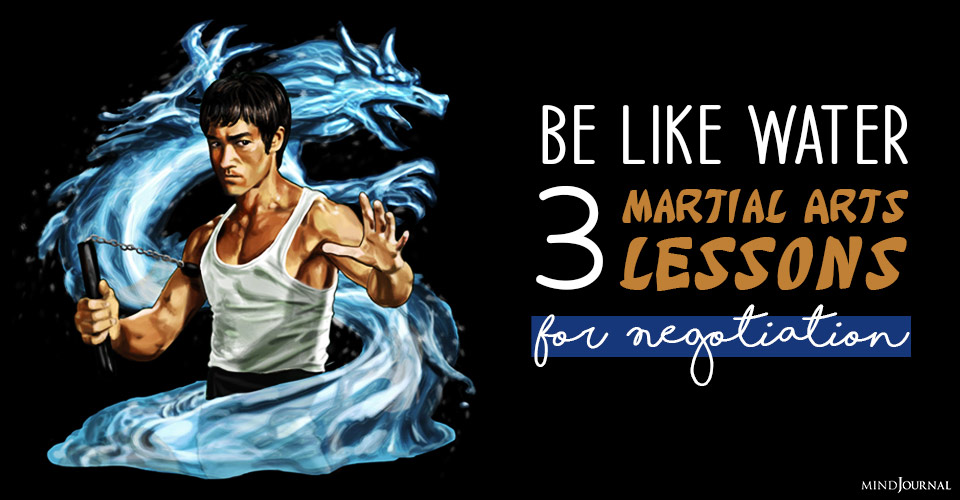Are you trying hard to improve your negotiation skills? These 3 lessons from martial arts may help you in your professional life.
You may wonder what martial arts and negotiation have in common. As a lifetime practicing martial artist, I constantly use lessons from various martial arts to help me in my professional life. One of the most common themes running through all martial arts is the silencing of the “self.” Martial artists meditate to quiet themselves and become more attuned to the processes of the self and the world around them.
Negotiators must also be mindful, especially if they wish to be successful. When you’re doing all the talking and pushing, you’re the rock or the stone. Whereas when you’re water, you take whatever shape you need to become. This puts you automatically in control, even if that requires patience and time. You can be prepared for anything without being blocked by your thoughts and senses.
Also read 7 Ways To Respond When Someone Shames You
If you’re tense or distracted by the planning and anticipation of your next move toward your opponent, you’re much more likely to be hit. Similarly, if your thoughts and senses block you in negotiation, you’re more likely to give away your position, strategy, and point of weakness.
But if you come prepared to listen with complete openness, you begin to notice things. You find openings in arguments, unravel the essential backstories behind the arguments and realize where the actual questions lie.
Negotiation is investigative; it’s an art for the curious. Those who approach it with an open and serene mind are less likely to expose their weak points for attack. This is what it means to become the water and not the stone.
Here are some martial arts techniques to apply to negotiations:
1. Relax without showing strength or weakness
Great competitors will not show their strength because it also may display a weakness. Revealing your strength can expose your vulnerability. To be like water, relax.
I recall an instance where I did exactly this. I was attending a play in New York City’s Times Square with my business partner at the time, accompanied by his girlfriend and my wife. After the fantastic show, the audience poured through the exit.
I was about 10 feet away from my wife and business partner’s girlfriend when I observed a man studying them. He seemed to be looking at their purses. I could sense he was about to make a move, so I immediately closed the gap and stood between him and the women.
I looked him in the eye and smiled and put out my hand to shake his hand, and I said, “Hey, how are you doing?” He put out his hand and shook mine, and I just said, “There’s nothing for you here.” He shook my hand for a little longer than you’d expect and then smiled and walked away.
This is a perfect example of the power of a be-like-water strategy. I wasn’t threatening. I wasn’t afraid. I could have approached the matter differently and been combative and accusatory, but that would have caused far more trouble than it was worth. I knew in that instance to be like the water — calm, collected. I listened and observed my surroundings and obstacles, ultimately knowing that through the art of listening and silencing myself that I could leave the situation unscathed yet wiser.
“In the struggle between the stone and water, in time, the water wins.” ̶ Japanese Proverb
Also read Thriving In The Teen Years: 5 Crucial Pieces Of Advice
2. Find openings
In martial arts, the search for that opening in your opponent is a patient one that eventually yields results.
Negotiation is a human process and thus rich in human interaction, showing your human side, establishing that you care, and demonstrating empathy make the people you interact with more comfortable. How can you do this? By listening and asking questions.
Imagine that you enter your negotiation with questions. You come in like water. You’re prepared but don’t presume your outcome by making demands of what you want. You ask good questions.
What are good questions? Those that, like water, find an opening.
Finding openings can be the most challenging part of a negotiation, and asking and listening offer the best opening. If you’re specific about precisely what you want at the outset, you may leave something important on the table. If you ask for too much, the negotiation may end quickly.
Openings require open-ended questions and a bit of small talk. People are more receptive to open-ended questions. Asking open-ended questions creates an atmosphere in which your counterparty thinks and believes that the ideas presented are his or her own.
Also read 5 Ways To Connect With Anyone As An Introvert
When you open by listening, you’re letting the other party in the negotiation lead. But you need to let them lead in a way that doesn’t appear as though you’re trying to corner them. This means asking open-ended questions, not closed-ended ones. Think of closed-ended questions as those that can be answered with yes or no, while open-ended questions welcome narrative.
Patiently search for that opening in your opponent. Consider borrowing from classic sales techniques and using questions to uncover shared interests. Respond to the opponent’s answers with follow-up questions to establish trust.
An opening I’ve used is: “So, why are we here?” I’ve diffused tension with a simple, “How can I help?”
Openings to negotiations should be simple, non-threatening, inviting, and used to establish trust.
3. Wait for the right moment
Don’t come into a negotiation with your sword drawn. Come in empty-handed. Come in formless and shapeless, like water. Come in prepared to ask evoking questions that will lead to discovering information that you can use to your advantage. But first, you must get them talking.
Intently concentrate on listening so that you’ll remember everything you hear. Uncover all of the essential backstories to find out the other party’s true desires and dissatisfactions and what they most want. Then, and only then, connect your services, your products, and your perspective with the other person’s needs and desires.
Also read 12 Characteristics of Passive Aggression and How To Deal With A Passive-Aggressive Partner
Openings are conceptual gaps where you can test, interject and match their needs and desires with yours. You must be so well prepared and clear on your negotiating position that introducing these as needs and opportunities will be effortless. It will be natural. You’ll be leading, but the other party will believe that the lead is theirs. When you behave and act this way, the other party will feel like they’re teaching you.
Come in ready to listen with complete openness until the opportunity to present your position arises. Most of all, be patient and relaxed. Be like water.
Please share this article with anyone who you may think will find it valuable and helpful.
Written by: Cash Nickerson Originally appeared on: Addicted2Success Republished with permission










Leave a Reply